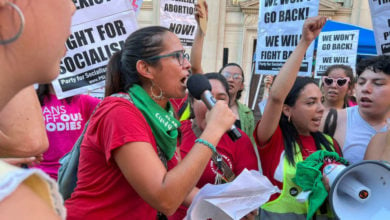On Sept. 8, in a vindication of the will of the pro-abortion majority of the state, the Michigan Supreme Court, composed of elected justices, ordered the state’s Board of Canvassers, a four-member appointed body, to place the Reproductive Freedom For All initiative on the ballot for voters to decide. Organizers had collected a record-breaking number of signatures to qualify the measure for the ballot.
Previously, the Board of Canvassers had rejected the placement of the RFFA initiative on the ballot, citing a formatting issue with the petitions. On Sept. 9, the Board of Canvassers complied with the State Supreme Court’s order. In related news, on Sept. 7, the state Supreme Court overturned an antiquated and horrific state anti-abortion law.
Mass outpouring of pro-abortion sentiment in RFFA petitioning drive
Over the summer, after the U.S. Supreme Court overturned Roe v. Wade in June, many individuals and organizations in Michigan sprang into action, coming together around the RFFA initiative. The coalition included the ACLU, Planned Parenthood, Michigan Voices, the Party for Socialism and Liberation and countless other groups and individuals for whom reproductive health and sovereignty is considered an inalienable right. The coalition gathered 752,288 signatures to put the proposal on the ballot — the most ever gathered for a ballot initiative in Michigan.
However, on Aug. 31, the Board of Canvassers in a 2-2 partisan split rejected placing the initiative on the ballot, earning widespread condemnation. The two Republican members voted to deny the certification of the petition, citing spacing errors in the petition. The Board’s decision to not certify the petition was immediately challenged by the Reproductive Freedom for All initiative and was presented to the Michigan Supreme Court, which is elected by Michigan voters.
A few days prior to the Board of Canvassers’ denial of ballot status to the RFFA, on August 18, an anti-abortion group, Citizens to Protect MI Women and Children funded by anti-abortion groups had submitted a legal challenge to the petition and argued that the petition should be rejected notwithstanding the historic number of signatures because “minimal spacing throughout the text of the constitutional amendment language with the substance of the petition resulted in a series of words being condensed into long, nonsensical letter combinations.”
Unelected Board of Canvassers defies the will of the people to vote on RFFA
Many signers and even petitioners themselves believed the huge amount of support as evidenced by the record-breaking number of signatures gathered would guarantee this proposal’s appearance on the ballot. That a board of four appointed officials could decide not accept such an initiative even when it had been recommended by another government body, the Bureau of Elections, appeared to many to be a stunning rebuke of the democratic will of the people of Michigan.
Michigan law requires only 425,059 signatures to be filed for a constitutional amendment to be placed on the November ballot. A report from the staff of the Board of Canvassers stated there were a sufficient number of signatures to satisfy the legal requirement and recommended that the Board approve certification of the petition. Despite this, the Board deadlocked in the 2 to 2 vote and the ballot initiative was denied as a result until this decision was overturned by the state Supreme Court.
The Board of Canvassers is an unelected body in charge of certifying ballot initiatives put forward by voters for either legislation or constitutional amendments. Established in the Michigan State Constitution of 1850, the Board is comprised of four members appointed by the governor with approval by the state senate. The Board members are selected by the two political parties receiving the greatest number of votes in the last Secretary of State election — meaning the Board has almost always been composed of Democrats and Republicans.
However, the Michigan Supreme Court is an elected body. While still a key part of the repressive apparatus of the capitalist state, these elected judges clearly do not want to appear to be on the side of the anti-abortion movement by allowing an unelected body to stifle a democratic process allowing the people of the state to decide this important issue.
MIchigan Court of Claims overturns 1931 anti-abortion law
On Sept. 7, a lawsuit in the Court of Claims was ruled in favor of plaintiffs Planned Parenthood of Michigan against defendants Michigan Attorney General, state House of Representatives and state Senate. The ruling held that Michigan’s draconian 1931 anti-abortion statute violated Michigan’s constitution. This followed the granting of the plaintiff’s motion for a preliminary injunction on May 17, which suspended the enforcement of the law pending the final ruling. In the decision, the court held that the law violated Michigan’s Equal Protection Clause found in Article I, Section 2 of the state Constitution. The ruling stated that “Article I, Section 2 of our Constitution does not permit the Legislature to impose unjustifiable burdens on different classes of pregnant women. It also forbids treating pregnant women as unequal to men in terms of their ability to make personal decisions about when and whether to be a parent.”
The language in this decision is of critical importance. The court in this case is saying that making abortion illegal treats women as unequal to men in violation of the state constitution. The reasoning in this decision is different from the rationale for abortion legalization expressed in the now-overturned Roe decision. In Roe, abortion was made legal until viability of the fetus on the basis of a right to privacy. While applying only to Michigan, this language sets an important legal precedent.






